
PUMPA - SMART LEARNING
எங்கள் ஆசிரியர்களுடன் 1-ஆன்-1 ஆலோசனை நேரத்தைப் பெறுங்கள். டாப்பர் ஆவதற்கு நாங்கள் பயிற்சி அளிப்போம்
Book Free DemoThe lesson 'Journey by Train' is an extract taken from the classic adventure novel named 'Around the World in Eighty Days', written by Jules Verne. The story revolves around an Englishman, Mr. Phileas Fogg and his adventurous journey, as he was challenged by his friends to go round the world in eighty days. This story is just a part of the novel (Around the World in Eighty Days).
Mr. Phileas Fogg started his journey along with his French attendant named Passepartout.
Mr. Phileas Fogg started his journey along with his French attendant named Passepartout.

Around the world in eighty days
His friends had challenged Phileas Fogg at the Reform Club, and the betted amount was 20,000 dollars. In today's economy, it would be equivalent to around $1.6 million roughly. He accepted the challenge. The novel, where the extract had been taken from, was written when the railways were being built in India. Jules Verne wrote this book a century ago and wrote some of the places with a different spelling.
Mr. Fogg's train started at the right time. A good number of officers, Government officials and merchants occupied the passenger list. Mr. Fogg's attendant Passepartout travelled along with him in the same carriage. The third passenger occupied the opposite place of them. The third passenger's name was Sir Francis Cromarty. Sir Francis happened to be Mr. Fogg's friend while he travelled on the ship of Mongolia that brought him to Bombay.
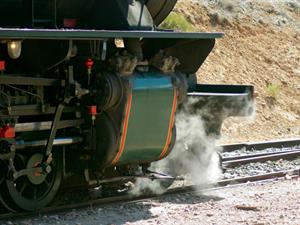
Journey by train
It was almost an hour the train left Bombay. It had passed the bridges and the Island of Salcette and had got into the open country. After some time, during the night, the train passed Nashik, leaving the mountains behind. And the next day, the train continued to cross over the flat, well-cultivated country of the Khandesh. The region of Khandesh is covered with villages. The villages were spread around all over and above which rose the towers of temples. The fertile area of Khandesh is watered by many small rivers and clear streams, mostly from the tributaries of the river Godavari.
When Passepartout woke up and looked outside, his eyes were filled with amazement. Jules Verne wrote the story during the railway built. It was when people started using the train newly as a means of transport, to cross huge distances. Passepartout started his train journey from Mumbai, had travelled throughout India by train. He could not believe the fact that he was crossing India on a railway train. The author had given a vast description of the engine of the train.
The English engineer had fed the train engine with coal which threw out the smoke upon cotton, coffee, nutmeg, clove, and pepper plantations. The steam that comes out from it looked like curled spirals around groups of palm-trees, in the midst of which were seen attractive bungalows. Those viharas (monasteries that left uncared) and marvellous temples were richly decorated with Indian architecture. Then they entered a huge area of jungles that stretched to the horizon. The jungles had been filled with snakes and tigers. The snakes and tigers were scared to hear the train's noise and so ran away. Then they reached a forest which had been filled with elephants. Those elephants looked sadly at the train with their fixed eyes while the train passed.
At half-past twelve, the train came to a halt in Burhampoor. Around this time, the travellers quickly finished their breakfast. Then the train restarted for Assurghur. They then travelled along the banks of the small river Tapty, which was flowing into the Gulf of Cambray, near Surat. Then, towards evening, the train entered the valleys of the Sutpour Mountains, which separate the Khandesh from Bundelcund. They reached Bundelcund at three in the morning.
The English engineer had fed the train engine with coal which threw out the smoke upon cotton, coffee, nutmeg, clove, and pepper plantations. The steam that comes out from it looked like curled spirals around groups of palm-trees, in the midst of which were seen attractive bungalows. Those viharas (monasteries that left uncared) and marvellous temples were richly decorated with Indian architecture. Then they entered a huge area of jungles that stretched to the horizon. The jungles had been filled with snakes and tigers. The snakes and tigers were scared to hear the train's noise and so ran away. Then they reached a forest which had been filled with elephants. Those elephants looked sadly at the train with their fixed eyes while the train passed.
At half-past twelve, the train came to a halt in Burhampoor. Around this time, the travellers quickly finished their breakfast. Then the train restarted for Assurghur. They then travelled along the banks of the small river Tapty, which was flowing into the Gulf of Cambray, near Surat. Then, towards evening, the train entered the valleys of the Sutpour Mountains, which separate the Khandesh from Bundelcund. They reached Bundelcund at three in the morning.
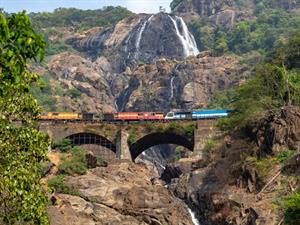
Mountain view from train
It was eight o'clock the train got stopped in the middle of the forest region, some fifteen miles beyond Rothal. The place was occupied with several bungalows, and workmen's wood houses, except for which nothing existed in the forest region. Mr. Fogg and his team did not know why the train had stopped in the middle of the forest. They thought to reach Calcutta through the train.

Train in the middle of forest
To their surprise, the conductor passed through every compartment and instructed the passengers to vacate the train. All three of them were shocked. They didn't know what to do. Phileas Fogg looked at Sir Francis Cromarty for an explanation. Still, the general couldn't give him an answer as he remained clueless about the helpless situation and remained speechless. He did not know why the train stopped in the middle of the forest filled with dates and acacias trees. After getting to know about the reason behind why the train had stopped, Passepartout quickly ran towards Mr. Fogg and his friends. He informed them there was no more train facility from that place.
To their surprise, the conductor passed through every compartment and instructed the passengers to vacate the train. All three of them were shocked. They didn't know what to do. Phileas Fogg looked at Sir Francis Cromarty for an explanation. Still, the general couldn't give him an answer as he remained clueless about the helpless situation and remained speechless. He did not know why the train stopped in the middle of the forest filled with dates and acacias trees. After getting to know about the reason behind why the train had stopped, Passepartout quickly ran towards Mr. Fogg and his friends. He informed them there was no more train facility from that place.
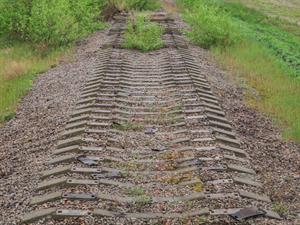
Incomplete rail route
Sir Francis was confused with the answer of Passepartout. He thought to reach Calcutta on the same train. Passepartout confirmed to him that the train could not continue further. Passepartout's reply aroused Francis' anger. He got down from the train to meet the conductor. Phileas Fogg calmly followed him. Sir Francis directly went to the conductor and demanded an explanation. Firstly, he questioned him as 'Where are we?'. The conductor replied to him as it was the village of Kholby. The train stops there, as it couldn't continue since the railway route was unfinished from that place to Allahabad. The general was not convinced with this answer and questioned the conductor again: ' What! not finished?'
The conductor clearly explained that there are fifty kilometres from Kholby to Allahabad; since the railway built on those fifty kilometres from Kholby to Allahabad was under process, the train stopped in Kholby. The train facility to Calcutta will again begin in Allahabad.
The conductor clearly explained that there are fifty kilometres from Kholby to Allahabad; since the railway built on those fifty kilometres from Kholby to Allahabad was under process, the train stopped in Kholby. The train facility to Calcutta will again begin in Allahabad.
Still, Francis was confused. He was irritated with the conductor's answer. He claimed to have read in the papers about the opening of the railway throughout. So, the rail route must have been connected from Bombay to Calcutta was Sir Francis's argument.
The conductor had understood the reason behind Mr. Francis' argument. The fact behind this was that, since it was mentioned on papers that the railroad connects throughout, Mr. Fogg and his team opted to complete their journey using train from Bombay to Calcutta. Since all three are from other countries, they were not aware that the railway built from Kholby to Allahabad was on progress. They missed to add those details in the papers that people had to use some other means of transport for those fifty kilometres (from Kholby to Allahabad).
The conductor, having understood the issue, explained these details to Mr. Francis. Francis was even angrier to hear this reply from the conductor; he asked the conductor why they sell tickets from Bombay to Calcutta, despite having no rail route for those fifty kilometres. The conductor informed them that the passengers were already aware of availing themselves transport for the fifty kilometres.
The conductor had understood the reason behind Mr. Francis' argument. The fact behind this was that, since it was mentioned on papers that the railroad connects throughout, Mr. Fogg and his team opted to complete their journey using train from Bombay to Calcutta. Since all three are from other countries, they were not aware that the railway built from Kholby to Allahabad was on progress. They missed to add those details in the papers that people had to use some other means of transport for those fifty kilometres (from Kholby to Allahabad).
The conductor, having understood the issue, explained these details to Mr. Francis. Francis was even angrier to hear this reply from the conductor; he asked the conductor why they sell tickets from Bombay to Calcutta, despite having no rail route for those fifty kilometres. The conductor informed them that the passengers were already aware of availing themselves transport for the fifty kilometres.
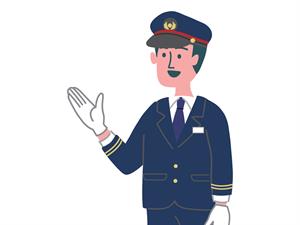
Train conductor
Sir Francis was angry. Passepartout did not dare to even look at Mr. Fogg. He wished to hit the conductor hard for his awful explanation on train destination at Kholby.
Sir Francis was angry. Passepartout did not dare to even look at Mr. Fogg. He wished to hit the conductor hard for his awful explanation on train destination at Kholby.
Mr. Fogg seemed to be very quiet and understanding. He kept himself calm and did not get angry at everyone or the worst situation. Though Mr. Fogg had a purpose of completing his journey on time, he did not feel worried about it. Instead, he planned to handle the situation in a better way. He politely requested the general, Mr. Francis, to look for other means of transport to cross the remaining fifty kilometres from Kholby to Calcutta.
Francis was worried about Mr. Fogg's delay referring to Fogg's challenge in eighty days. He was worried that this incident was an obstacle to his tour progression. He did not expect this delay, but Mr. Fogg consoled him by saying the hurdle was expected. General Francis was confused. He asked Mr. Fogg whether he already knew about the issue associated with the railway route. Mr. Fogg replied that he did not know that there was an incomplete railway issue, but he still thought about some hurdle on his way. As Fogg had guessed about it, he didn't worry about the problem; he felt nothing was lost due to the problem.
The thing is, a ship starts from Calcutta on 25th noon in another two days. So, Mr. Fogg had two days in his hand. If he could catch that Calcutta ship on 25th, he would be able to reach Hong Kong. So, crossing fifty miles from Kholby to Allahabad and then reaching Calcutta in two days seems to be a possible task for Mr. Fogg since the 22nd.
Francis was worried about Mr. Fogg's delay referring to Fogg's challenge in eighty days. He was worried that this incident was an obstacle to his tour progression. He did not expect this delay, but Mr. Fogg consoled him by saying the hurdle was expected. General Francis was confused. He asked Mr. Fogg whether he already knew about the issue associated with the railway route. Mr. Fogg replied that he did not know that there was an incomplete railway issue, but he still thought about some hurdle on his way. As Fogg had guessed about it, he didn't worry about the problem; he felt nothing was lost due to the problem.
The thing is, a ship starts from Calcutta on 25th noon in another two days. So, Mr. Fogg had two days in his hand. If he could catch that Calcutta ship on 25th, he would be able to reach Hong Kong. So, crossing fifty miles from Kholby to Allahabad and then reaching Calcutta in two days seems to be a possible task for Mr. Fogg since the 22nd.
Mr. Fogg and Sir Francis had searched the whole village of Kholby; but, they weren't able to find any vehicle to travel to Allahabad.
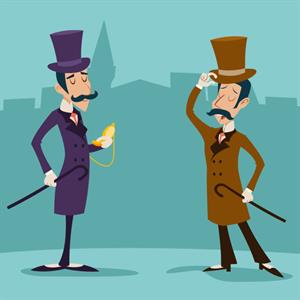
Mr. Fogg and Francis
Finally, Mr. Fogg decided to cross the fifty miles by walk. He informed the same to Sir Francis. Passepartout also rejoined them both. He was worried to overhear the conversation between Sir Francis and Phileas Fogg. He did not want his impressive shoes to get spoiled.
He then looked at his surroundings and became happy, and after a moment, hesitatingly revealed a suggestion. He claimed to have found some other means of transport to Allahabad. Both Mr. Francis and Mr. Fogg was surprised by Passepartout's answer. It was an elephant Passepartout had chosen as a vehicle. Passepartout explained that an Indian man who had the elephant in the Khloby did not reside so far, but a hundred steps from where they stood.
The name of the animal was Kiouni. He suggested an elephant ride from Kholby to Allahabad as it would surely help to reach Allahabad quickly. Mr. Fogg accepted the suggestion of Passepartout and decided to hire Kiouni for an hour to reach Allahabad.
Finally, Mr. Fogg decided to cross the fifty miles by walk. He informed the same to Sir Francis. Passepartout also rejoined them both. He was worried to overhear the conversation between Sir Francis and Phileas Fogg. He did not want his impressive shoes to get spoiled.
He then looked at his surroundings and became happy, and after a moment, hesitatingly revealed a suggestion. He claimed to have found some other means of transport to Allahabad. Both Mr. Francis and Mr. Fogg was surprised by Passepartout's answer. It was an elephant Passepartout had chosen as a vehicle. Passepartout explained that an Indian man who had the elephant in the Khloby did not reside so far, but a hundred steps from where they stood.
The name of the animal was Kiouni. He suggested an elephant ride from Kholby to Allahabad as it would surely help to reach Allahabad quickly. Mr. Fogg accepted the suggestion of Passepartout and decided to hire Kiouni for an hour to reach Allahabad.
When Mr. Fogg had asked for an elephant hire, the elephant's owner did not accept. He disagreed with giving out his elephant for hire. Still, Mr. Fogg did not give up his decision. He was determined to get the elephant hired and kept increasing the hiring amount from ten to forty. The elephant's owner was unwilling to give his elephant for hire. Phileas Fogg had not worried even a little. He immediately proposed to purchase the animal at that very moment, and he offered a thousand pounds for the elephant. The elephant's owner had not accepted the offer still. It must be that he was expecting a great price, and so he kept refusing Fogg's price proposals.
Firstly, Mr. Fogg told him that he would offer twelve hundred, then fifteen hundred, and then eighteen hundred. At last, he admitted to give two thousand pounds for the elephant. Passepartout was shocked; became fairly white at the announcement of Mr. Fogg. The elephant owner accepted to sell his elephant for two thousand pounds.
Passepartout was greatly surprised. He never expected Mr. Fogg to offer such a massive amount of two thousand pounds for an elephant. A young, intelligent man came forward to be their guide and drive the elephant till Allahabad. Fogg accepted his offer. He also promised the guide a huge reward. This offer increased the spirit of the elephant driver. The elephant was then taken out and equipped with essential things to make Mr. Fogg and his team seated on the elephant.
The guide was an expert in elephant driving. He made necessary arrangements on the elephant's body to make people seated. He covered the elephant’s back with the leather seat; and attached howdahs to each side of the elephant.
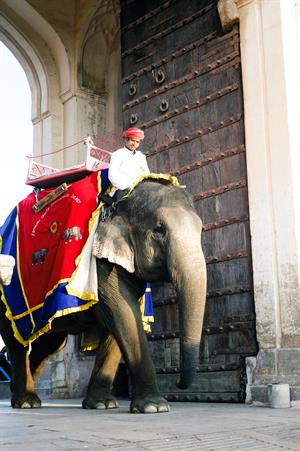
Howdah on an elephant
In this way, two people can sit on both sides of the elephant. Mr. Fogg took some banknotes from his travel bag and paid it to the elephant owner; Passepartout had lost his breath for a while when he saw Mr. Fogg giving banknotes for the driver.
When the seating arrangements got over, Sir Francis and Mr. Fogg took the howdahs on both sides and Passepartout occupied the middle place on the saddle-cloth between both. The elephant driver sat on the elephant's neck. Mr. Fogg and his team started their journey from Kholby at nine o’clock. Mr.Fogg and his team rode through the dense forest fastly through shortcuts.